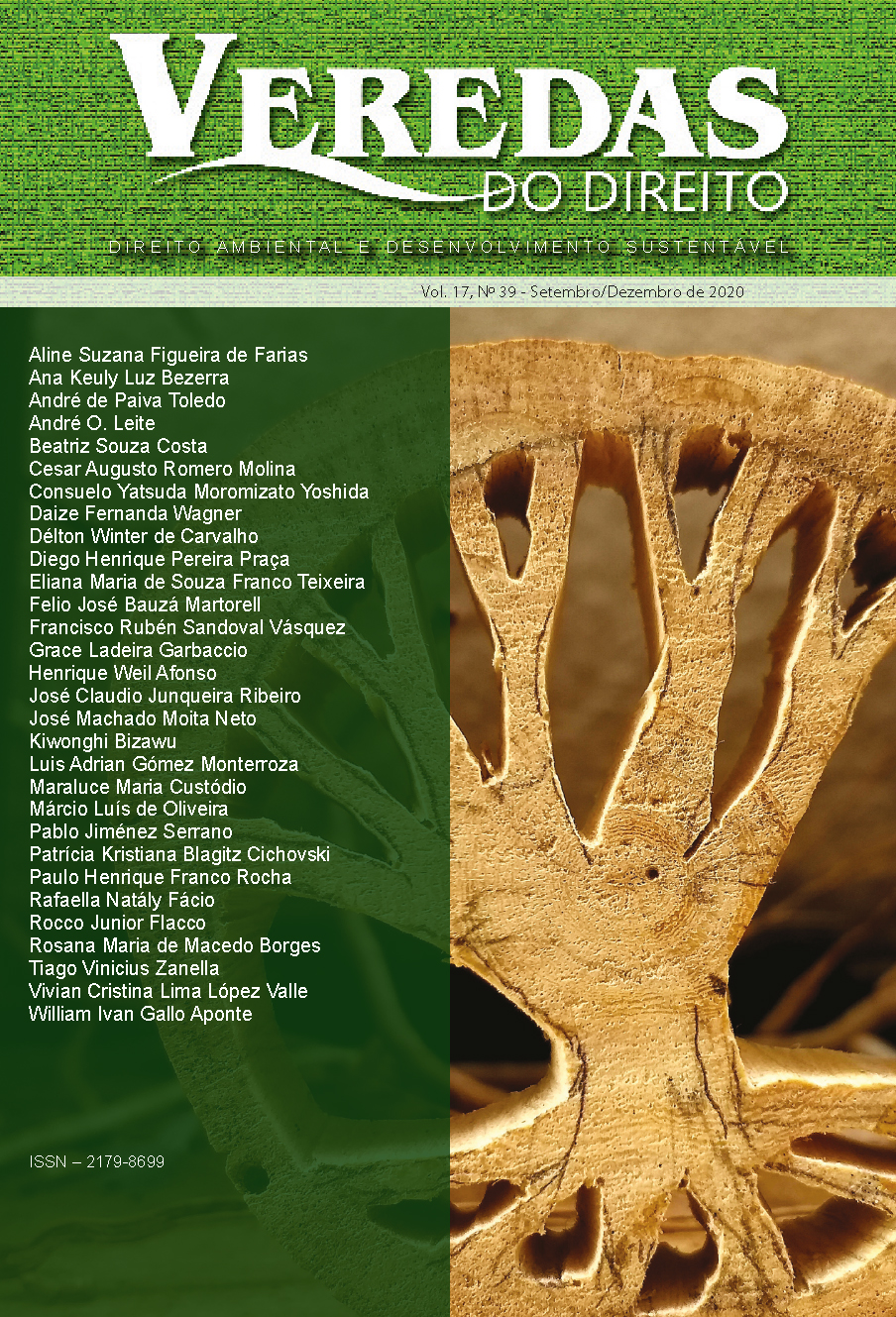THE ENVIRONMENTAL IMPACTS OF THE “MARITIME AUTONOMOUS SURFACE SHIPS” (MASS)
##plugins.themes.bootstrap3.article.main##
Resumo
Autonomous ships are already a reality. They are on the agenda of international law and international society in general. In a short time, it will also be a reality in all the world’s oceans. Thus, international organizations, States and international society need to be prepared for these autonomous ships. They will bring new challenges to the law of the sea and international maritime transport. One of these challenges is just what are the environmental impacts that these “Maritime Autonomous Surface Ships” (MASS) will bring with them. That is, what are the consequences for the marine environment of these autonomous ships? This is precisely the objective of this article: to understand the environmental impacts of MASS and what are the new challenges that humanity will have to face the imminent advent of these ships. In this sense, it will be demonstrated what the advantages and disadvantages of these vessels for the environment are and, in particular, what care the world needs to take to protect and preserve the marine environment due to the advent of these new technologies.
##plugins.themes.bootstrap3.article.details##
Submeto (emos) o presente trabalho, texto original e inédito, de minha (nossa) autoria, à avaliação de Veredas do Direito - Revista de Direito, e concordo (amos) que os direitos autorais a ele referentes se tornem propriedade exclusiva da Revista Veredas, sendo vedada qualquer reprodução total ou parcial, em qualquer outra parte ou outro meio de divulgação impresso ou eletrônico, dissociado de Veredas do Direito, sem que a necessária e prévia autorização seja solicitada por escrito e obtida junto ao Editor-gerente. Declaro (amos) ainda que não existe conflito de interesse entre o tema abordado, o (s) autor (es) e empresas, instituições ou indivíduos.
Reconheço (Reconhecemos) ainda que Veredas está licenciada sob uma LICENÇA CREATIVE COMMONS:
Licença Creative Commons Attribution 3.0Referências
CHAUVIN, Christine. Human Factors and Maritime Safety. The Journal of Navigation, Vol. 64, pp. 625–632; 2011.
CHIRCOP, Aldo. Maritime Autonomous Surface Ships in International Law: New Challenges for the Regulation of International Navigation and Shipping. In: NORDQUIST, Myron H.; MOORE, John Norton; LONG, Ronán. Cooperation and Engagement in the Asia-Pacific Region. Brill | Nijhoff, pp. 18-32; 2019.
CHIRCOP, Aldo; ROBERTS, Julian; PRIOR, Siân; Area-based Management on the High Seas: Possible Application of the IMO’s Particularly Sensitive Sea Area Concept. The International Journal of Marine and Coastal Law, vol. 25, P. 483–522; 2010.
CHONG, Jia Chyuan. Impact of maritime autonomous surface ships (MASS) on VTS operations. World Maritime University. Suécia; 2018.
FASTVOLD, Oda Loe. Legal Challenges for Unmanned Ships in International Law of the Sea. The Arctic University of Norway. 2018.
HOGG, Trudi; GHOSH, Samrat. Autonomous merchant vessels: examination of factors that impact the effective implementation of unmanned Ships. Australian Journal of Maritime and Ocean Affairs, 2016 Vol. 8, Nº. 3, pp. 206–222, 2016.
LARDJANEB, Salim; MORELA, Gaël; CLOSTERMANNC, Jean-Pierre; LANGARDA, Benoît; CHAUVIN, Christine. Human and organisational factors in maritime accidents: Analysis of collisions at sea using the HFACS. Accident Analysis and Prevention, Vol. 59, pp. 26–37; 2013.
LAVENDER, Kara; MORET-FERGUSON, Skye; MAXIMENKO, Nikolai A.; PROSKUROWSKI, Giora; PEACOCK, Emily E., HAFNER, Jan; REDDY, Christopher M. Plastic Accumulation in the North Atlantic Subtropical Gyre. Science, Vol. 329; September 2010.
LI, Stephen; FUNG, K.S. Maritime autonomous surfasse ships (MASS): implementation and legal issues. Maritime Business Review, Vol. 4 No. 4, pp. 330-339; 2019.
LIU, Donald. Autonomous Vessel Technology, Safety, and Ocean Impacts. In.: WERLE, Dirk (et. All); The Future of Ocean Governance and Capacity Development. pp. 490- 494, Koninklijke Brill, Leiden, 2018.
MIOLA, Apollonia; CIUFFO, Biagio; GIOVINE, Emilian; MARRA, Marleen. Regulating Air Emissions from Ships: The State of the Art on Methodologies, Technologies and Policy Options. Publications Office of the European Union; Luxembourg; 2010.
MSC.1/Circ.1526. Interim Guidelines on Maritime Cyber Risk Management. 2016.
MUNIN. New ship designs for autonomous vessels. 2015.
PEDROZO, Raul (Pete). US Employment of Marine Unmanned Vehicles in the South China Sea. In.: BUSZYNSKI, Leszek; HAI, Do Thanh. The South China Sea: From a Regional Maritime Dispute to Geo-Strategic Competition. 1st Edition, Routledge, Londres; 2019. P. 211.
PORTELA, R. de la Campa. Maritime Casualties Analysis as a Tool to Improve Research About Human Factors on Maritime Environment. Journal of Maritime Research, Vol. II. No. 2, pp. 3-18, 2005. P. 4.
PRIMO, Diego de Alencar Salazar; BARRETO, Cecília Perdigão; MONT ALVERNE, Tarin Cristino Frota. Direito Internacional e Poluição Sonora Marinha: efeitos jurídicos do reconhecimento do som como fonte de poluição dos oceanos. Veredas do Direito, Belo Horizonte,v.15n.32p.277-295Maio/Agosto de 2018.
RENSBURG, Dirk Johannes Janse Van. The impact of autonomous ships on the containerised shipping interface of global supply chains and networks: a literature examination of selected stakeholder perspectives. World Maritime University Dissertations. 659. Malmö, Sweden; 2018.
RINGBOM, Henrik. Regulating Autonomous Ships—Concepts, Challenges and Precedents. Ocean Development & International Law. 2019.
ROBERTS, Julian. Marine Environment Protection and Biodiversity Conservation. Springer-Verlag, Berlin – Heidelberg; 2007.
SANDS, Philippe; PEEL, Jacqueline. Principles of International Environmental Law. Cambridge University Press, Reino Unido; 2012.
TANAKA,Yoshifumi. The International Law of the Sea. Cambridge University Press, 2 ed., Nova Yorque; 2015.
VILLA CARO, Raúl. Los Mass: Los Buques Inteligentes y Autónomos Del Futuro. Apoyo Logístico 4.0, pp. 395-407; 2018.
WANG Chengbo; ZHANG Xinyu; LI Ruijie; DONG Peifang. Path Planning of Maritime Autonomous Surface Ships in Unknown Environment with Reinforcement Learning. In.: MAIMAITI Mieradilijiang (Et.al). Cognitive Systems and Signal Processing. pp. 127–137 Springer Singapore, 2019.
WRÓBELA, Krzysztof; MONTEWKA, Jakub; KUJALA, Pentti. Towards the assessment of potential impact of unmanned vessels on maritime transportation safety. Reliability Engineering and System Safety, Vol. 165, pp. 155–169; 2017.



































